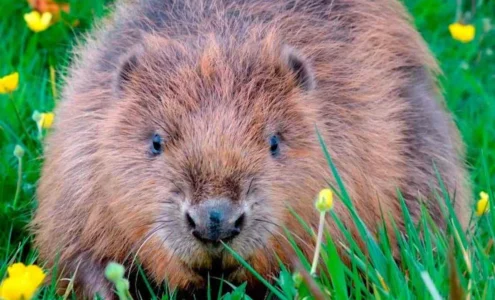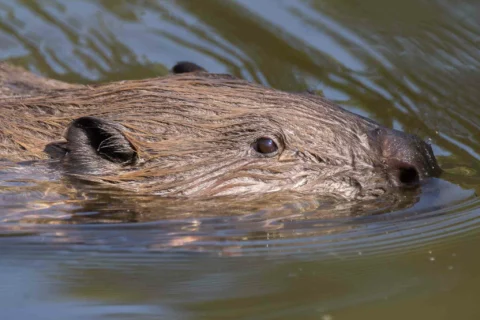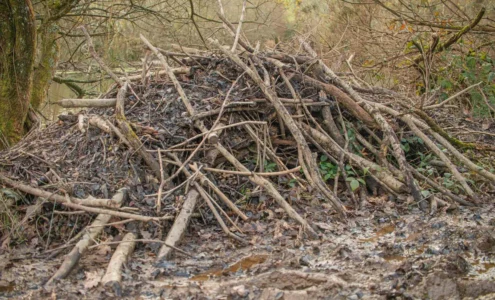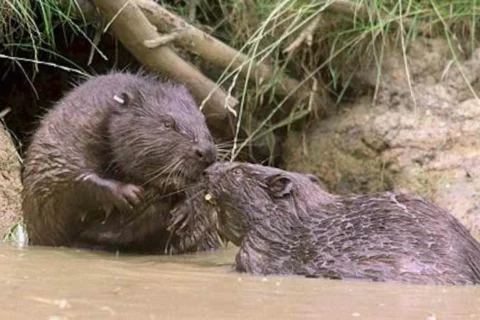- The Great Cornwall Guide
- Destinations
- Things to do
- Beach Guide
- Food & Drink
- Properties
- Journal
- Golden Lobster Reviews
- Destinations
Blown away by its beaches and spectacular scenery, it is sometimes easy to forget the call of the living wild, the lure of the animal world in Cornwall. Yet, behind the scenes, amazing work is quietly taking place, with Cornwall at the forefront of ecological initiatives.

From precious Cornish choughs once again flying free on the Lizard, to the seal sanctuary at Gweek and screech owls at Newquay, there are plenty of places here in the SW to rejoice in nature while also learning about the rescue, rehabilitation, release and conservation of wildlife.
Sometimes, however, animals rescue us, which is exactly what beavers who have been reintroduced to Cornwall, have done.
Beavers are magical, nature’s miracle workers, but had become extinct in Britain; it is thrilling to see them now back ‘beavering away’ in the south-west because they are incredibly useful.
These large, nocturnal, fast swimming, semi-aquatic animals who can stay under water for up to fifteen minutes, are the second largest rodents in the world. They are astute architects, nature’s builders. They also look pretty cute, despite being of large spaniel-size. Now, beavers’ talents are being used to help create flood defences.

During 2020’s devastating Storm Dennis flooding, some areas of the country coped much better than others. One of these areas was the village of Ladock, near Truro, where a cheap but highly effective ‘beaver-solution’ was used to solve the problem of previously devastating river flooding which had severely impacted the community.
Cleverly, beavers build amazing dams to deepen watercourses. This creates ‘lodges’ which helps them feel safer from predators; their natural love of dam-building has also been a real help to other species such as water voles and otters, too. These charismatic animals are charming workaholics, which are not only a ‘lost’ species but also create their own eco-systems.

Apart from in zoos, most of us have probably never seen a beaver. They were once native to our shores but were sadly hunted down for the animals’ dense, soft fur which, in the sixteenth century was used to make clothes and hats, while their scent glands (which happen to smell like vanilla) were used in food and perfume, and their meat was pretty valuable, too. Unfortunately, they were hunted to extinction in the UK, and we have reaped the results.
Beavers were reintroduced to Cornwall in 2017 by Chris and Janet Jones of Woodland Valley Farm, in a ground-breaking project on their specially fenced 5-acre site. On their farmland above the village of Ladock, a stream has been fenced to create a beaver enclosure.

By law, beavers have to be enclosed, so are not allowed to roam free – yet. Two adult beavers were released into the large pond and left to start dam building, to alleviate flooding and improve water quality. Here, Cornwall Wildlife Trust show you how it works. Now, the University of Exeter is also involved in studying the impact of beavers on the land/waterscape, in research that has put Cornwall on the global map.
After 8 weeks, the two beavers one male, one female, had constructed 4 dams, with a flow reduction, creating for themselves a deeper pond. The Eurasian pair were released on a Friday, scoped the place out on the Saturday and got to work on Sunday, with no slacking.
Their enclosure in this little pocket of wilderness holds back a massive million litres of water. This means that in heavy rainfall, water is released much more slowly giving the landscape more opportunity to adapt to the heightened moisture levels.
Recently, the special Cornwall beavers featured with Gillian Burke on BBC’s Springwatch.
If you’d like to visit the beavers, The Cornwall Beaver Project runs bookable weekly beaver walks from spring through to autumn. Visitors can see the beaver dams in daylight then sit until dusk to try and glimpse the animals as they emerge. All Beaver Project Guided Walks for individuals, families and small groups are available to book now online. You can also find out more about the Cornwall Beaver Project here.